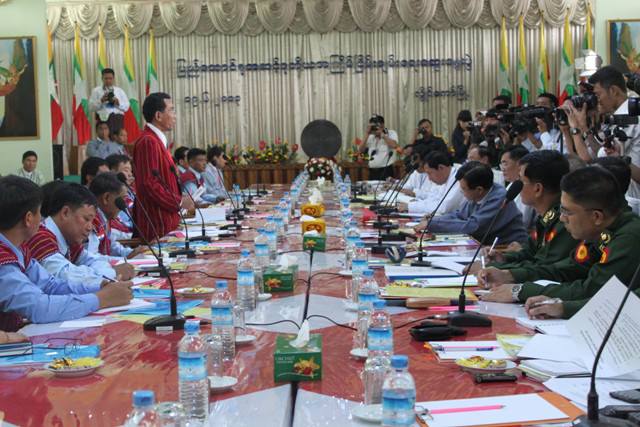Karenni rebels and government peace negotiators have agreed to begin resettling some of the thousands of people displaced by years of ethnic conflict in eastern Burma, at a landmark meeting on Wednesday.
The Karenni National Progressive Party (KNPP) and government representatives are currently in the Karenni state capital Loikaw for two-day peace talks aimed at strengthening the tentative ceasefire deal inked last year.
A representative for the KNPP told DVB that the talks had yielded some positive results, including plans to begin resettling some of the thousands of internally displaced persons (IDPs) in the conflict-torn state.
“We agreed to cooperate [with the government] on regional development, resettlement of IDPs and to work together with [anti-narcotic] groups for drug elimination,” said Aung San Myint, adding that both sides had also decided to form a joint committee to assist the peace monitoring group resolve local disputes.
“We are still negotiating, but the joint committee aims to improve communication with the monitoring group and to strengthen the ceasefire,” he said.
The meeting — which was overseen by several observers, including an official from the US embassy, community leaders and several members of parliament — represents a significant step towards national reconciliation, according to the government’s chief negotiator, Aung Min.
He told participants that President Thein Sein is planning to invite UN Secretary-General Ban Ki-moon to oversee the signing of a nation-wide ceasefire agreement with ethnic minority groups, adding that the government is open to the possibility of federalism.
“Looking back at history, what is needed the most – since ethnic nationalities have been calling for equality and self-determination – is a way for a federal system. The president has a plan to make a speech on federalism in the near future.”
Ethnic minority groups make up almost 40 percent of the population and armed factions have fought the government for greater autonomy and rights over several decades.
President Thein Sein has been lauded for signing ceasefire deals with ten out of eleven ethnic armed groups in Burma, since taking office in March 2011. But ongoing clashes have been reported in several states, including Shan and Kachin states in north-eastern Burma. Most rebel groups, including the Kachin Independence Army, which has yet to sign a formal ceasefire deal with the regime, have consistently called for a federal union as a prerequisite to lasting peace.
High ranking military officials, who attended the talks, also affirmed their commitment to defend ethnic minorities and promote nation-wide peace.
“We will sincerely and respectfully adhere to the agreements,” said Maj-Gen Aung Than Htut, the chief of Bureau of Special Operations-2 in Burma’s armed forces. ”Being the Tatmadaw [armed forces], we are meant to protect any ethnic group regardless of who they are.”
However, he also vowed to uphold the controversial 2008 constitution, which reserves 25 percent of parliamentary seats for the military and provides the legal framework for Burma as a unitary state. Constitutional reform would be necessary in order to develop a federal union.
The KNPP signed a ceasefire with the military government in 1995, but it broke down less than three months later. On 9 June 2012, the two sides signed a historic union-level ceasefire agreement with the reformist regime, led by Thein Sein. This week’s meeting represents the first time the two sides have met in nearly a year.



